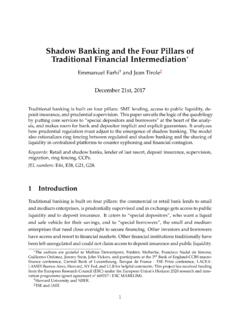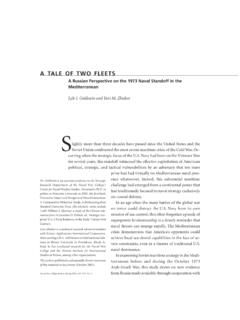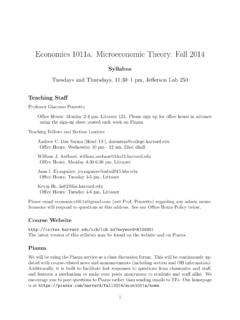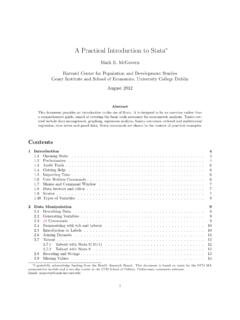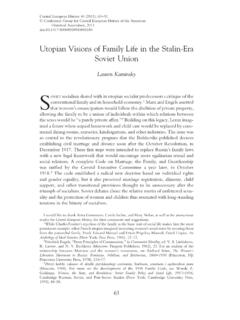Transcription of Emotion and Decision Making - Harvard University
1 Emotions and Decision Making , p. 1 Emotion and Decision Making Jennifer S. Lerner Harvard University Ye Li University of California, Riverside Piercarlo Valdesolo Claremont McKenna College Karim Kassam Carnegie Mellon University Draft Date: 16 June 2014 Manuscript submitted for publication in the Annual Review of Psychology Emotions and Decision Making , p. 2 Contents I. Introduction .. 3 II. Emotional Impact on Judgment and Decision Making : Eight Major Themes .. 5 Theme 1: Integral emotions influence Decision Making .. 5 Theme 2: Incidental emotions influence Decision Making .
2 7 Theme 3: Valence is not the only way that emotions influence Decision Making .. 9 Theme 4: Emotions shape decisions via the content of thought .. 12 Theme 5: Emotions shape the depth of thought .. 16 Theme 6: Emotions shape decisions via goal activation .. 18 Theme 7: Emotions influence interpersonal Decision Making .. 20 Theme 8: Unwanted effects of Emotion on Decision Making can sometimes be reduced .. 23 III. General model .. 29 IV. 33 36 Disclosure Statement .. 36 Definitions List .. 36 Literature Cited .. 38 Keywords: affect, mood, appraisal tendency, judgment, choice, behavioral economics Abstract A revolution in the science of Emotion has emerged in the last few decades, with the potential to create a paradigm shift in thinking about Decision theories.
3 The research reveals that emotions constitute powerful, pervasive, and predictable drivers of Decision Making . Across different domains, important regularities appear in the mechanisms through which emotions influence judgments and choices. The present paper organizes and analyzes what has been learned from the past 35 years of work on Emotion and Decision Making . It also proposes an integrated model of Decision Making that accounts for both traditional (rational-choice theory) inputs and emotional inputs, synthesizing scientific findings to date.
4 Emotions and Decision Making , p. 3 Hence, in order to have anything like a complete theory of human rationality, we have to understand what role Emotion plays in it. -- Herbert Simon, 1983, Reason in Human Affairs, p. 29 I. INTRODUCTION Nobel Laureate Herbert Simon (1967, 1983) launched a revolution in Decision theory when he introduced bounded rationality, a concept that would require refining existing models of rational choice to include cognitive and situational constraints. But as the quote above reveals, Simon knew his theory would be incomplete until the role of Emotion was specified, thus presaging the crucial role contemporary science has begun to give Emotion in Decision research.
5 Across disciplines ranging from philosophy (Solomon 1993) to neuroscience ( , Phelps et al in press), an increasingly vibrant quest to identify the effects of Emotion on judgment and Decision Making (JDM) is in progress. Such vibrancy was not always apparent. In economics, the historically dominant discipline for research on Decision theory, the role of Emotion in Decision Making rarely appeared for most of the 20th century, despite featuring prominently in influential 18th and 19th century economic treatises (for review, see Loewenstein & Lerner 2003).
6 The case was similar in psychology for most of the 20th century. Even behavioral Decision researchers critiques of economics rational Decision models focused primarily on understanding cognitive processes. Moreover, research examining Emotion in all fields of psychology remained scant (for review, see Keltner & Lerner 2010). The online Supplemental Text for this article examines the curious history of scientific attention to Emotion . The supplement also includes primers on the respective fields of (a) Emotion and (b) judgment and Decision Making .
7 The present paper examines theories and evidence from the nascent field of Emotion and Decision - Making , ranging from approximately 1970 until the present. It emphasizes studies in the Emotions and Decision Making , p. 4 behavioral sciences, especially psychology, as opposed to studies in neuroscience, which are comprehensively reviewed in the Annual Review of Neuroscience (see Phelps et al in press). In recent years, the field has grown rapidly; yearly scholarly papers on Emotion and Decision Making doubled from 2004 to 2007 and again from 2007 to 2011, and increased by an order of magnitude as a percentage of all scholarly publications on Decision Making (already a quickly growing field) from 2001 to 2013.
8 Figure 1. Number of scholarly publications from 1970 to 2013 that refer to Emotion (s)/affect/mood and Decision Making (in red bars) and percentage of all scholarly publications referring to Decision Making that this represents. Indeed, many psychological scientists now assume that emotions are the dominant driver of most meaningful decisions in life ( , Ekman 2007, Frijda 1988, Gilbert 2006, Keltner & Lerner 2010, Keltner et al 2014, Lazarus 1991, Loewenstein et al 2001, Scherer & Ekman 1984). Decisions serve as the conduit through which emotions guide everyday attempts at avoiding negative feelings ( , guilt, fear, regret) and increasing positive feelings ( , pride, happiness, love), even when we lack awareness of these processes (for reviews, see Keltner & Lerner 2010, Loewenstein & Lerner 2003).
9 And once the outcomes of our decisions materialize, we often feel # of papers on "emotions/affect/mood and Decision Making "% of all " Decision Making " papers on emotions/affect/moodEmotions and Decision Making , p. 5 new emotions ( , elation, surprise, and regret, Coughlan & Connolly 2001, Mellers 2000, Zeelenberg et al 1998). Put succinctly, Emotion and Decision Making go hand in hand. Objectives and Approach This paper provides organizational structure to and critical analysis of research on Emotion and JDM. Due to strict space and citation-count limits as well as the unusually long (three-decade) span of material to be covered, we had to be selective.
10 When multiple studies represented reliable scientific discoveries, for example, we necessarily restricted ourselves to one or two key studies. We also gave preference to studies that contribute to theoretical development over studies that stand alone as interesting phenomena. II. EMOTIONAL IMPACT ON JUDGMENT AND Decision Making : EIGHT MAJOR THEMES In surveying research on Emotion and Decision Making , eight major themes of scientific inquiry emerged. Consistent with the fact that the field is in its infancy, these themes typically: (a) vary in the amount of research conducted, (b) contain few competing theories, (c) include few definitive conclusions, (d) display relative homogeneity in methodology, and (e) examine fundamental questions about the nature of Emotion and Decision Making rather than refinements about known phenomena.


